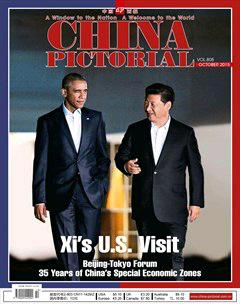Pony Ma:Changing Communication
by+Li+Zhuoxi
“The success of Tencent can be attributed to many factors,” illustrates Pony Ma, founder and CEO of Tencent Group. “Shenzhen greatly inspired our dreams, passion and unremitting efforts to work for the future and provided the best environment for companies like Tencent to start business, innovate, and grow.”
Valued at US$159.6 billion on the market, Tencent has become the largest internet company in Asia. By the end of 2014, active users of its QQ topped 829 million, trailing only Facebook as the second largest social network on the planet. As Chinas largest instant messaging (IM) supplier, Tencent boasts over 1 billion registered users, tripling the total population of the United States.
The things his company has achieved far exceed Pony Mas expectations.
Back in February 1998, Pony Ma and Zhang Zhidong jointly developed Chinese ICQ. In November 1999, 10 months after the release of OICQ, its registered users exceeded 1 million. Despite its exciting growth in user base, the company could hardly carry on without a profit model.
Ma tried selling shares of his company. “We talked with four potential purchasers, but nothing worked out after all the negotiations,” he grins. “So we had to move on.”
The year 1998 was good for Tencent. Chinas High-tech Fair was held in the Shenzhen Special Economic Zone (SEZ) to intensify the fusion of capital and projects. American angel investor IDG financed the company with US$2.2 million, injecting energy to the young business.
In 2004, Tencent was listed in Hong Kong, making Pony Ma worth more than 9 million yuan on paper.
“It only took six years for Tencent to beat its rivals and claim an overwhelming market share as the leading Chinese cyber social community with the most active users,” explains Wang Juntao, a senior internet analyst. “The glory belongs to not only the company but also to Chinese internet users.”
October 2010 brought the emergence of Kik, an IM application enabling text messaging within ones contact list free of charge, which quickly attracted a million users and the attention of insiders.
Zhang Xiaolong, general manager of the Tencent Guangzhou R&D Department, kept a close eye on the rapid rise of Kik. “The mobile internet will embrace a new IM era and present a big threat to QQ,” Zhang asserted. He suggested Pony Ma develop a new instant messenger, an idea which was warmly embraced. On November 19, 2010, Zhangs department launched the development of WeChat, which aroused rumbling within Tencent. Many employees didnt see any point in WeChat because Mobile QQ could already do everything it was intended to do. Furthermore, Mobile QQ already existed as a more powerful channel with a larger user base.”
Zhang and his R&D team, facing such a pressure, received great support from Ma.
WeChat debuted in 2011. On March 29, 2012, its user base reached 100 million: zero to 100 million in only 433 days.
Today, WeChat is the most popular mobile app on the Chinese market. As a social networking tool, it can so easily addict users with its messaging, news sharing, photos and videos, and networking. To expand its business globally, WeChat has issued foreign language versions.
“Without WeChat, Tencent would have been gone today because the rules of the mobile internet era are completely different from the PC era,” remarked Pony Ma at a 2013 speech.
By the end of the first quarter of 2015, WeChat announced its tally of active users – 549 million – in more than 200 countries and over 20 languages. Within six months, its user base surpassed 50 percent of that of QQ, which took the former 14 years to accumulate, making a dramatic change in communication modes across the country.
Even The New York Times noted that the growth rate of WeChat users has overtaken that of Facebook or Twitter, thanks to the apps dominant position in China, the largest smartphone market on the planet.

